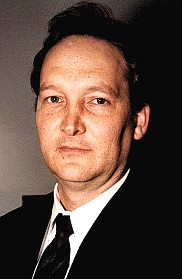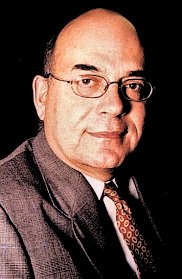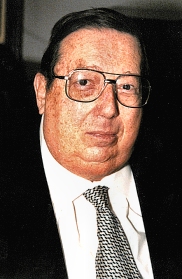


HANK GOLDBERG
JOSEPH DEERING JR.
DONALD RENETZKY
Wednesday, February 20, 2002
Page 5
Los Angeles Superior Court Office No. 2
Prosecutor, Private Practitioner, ALJ Face Off in Tight Race
|
|
|
|
|
HANK GOLDBERG |
JOSEPH DEERING JR. |
DONALD RENETZKY |
By ROBERT GREENE, Staff Writer
It seemed in 1995 that all it would have taken for the dozens of O.J. Simpson trial pundits to schedule a seven-year reunion was the suggestion that one of the prosecution team was going to run to become Lance Ito’s colleague.
The daily critiquing of the Simpson trial was endless and excruciating in detail, and the appetite for even the most mundane personality quirk was insatiable. Newspaper stories detailed Marcia Clark hairstyle. Johnnie Cochran launched a TV career.
Every witness, every lawyer, every commentator and even a few jurors became household names. More than a dozen books were written on the spectacle, including one from pretty much every prosecutor and defense lawyer involved.
So it is somewhat of a surprise that in December 2001, hardly a ripple was raised when Simpson prosecutor Hank Goldberg filed to run for Los Angeles Superior Court Office No. 2. More than two months later, with election day rapidly approaching, the race still has garnered no mention outside the legal press.
It is a measure of the extraordinarily low public interest in judicial elections that even an O.J. connection cannot garner so much as a raised eyebrow.
Goldberg, a serious and accomplished deputy district attorney, is vying for one of seven seats on the ballot with seasoned Santa Monica private practitioner and legal educator Joseph Deering Jr. and longtime administrative law judge Donald Renetzky.
A debate among the three, or at least a forum at which the candidates exchange their views on what qualities make for the best judge, would likely be instructive. Absent that, candidate statements in which the candidates make their best case directly to voters could be compared.
But there probably will be no debate, given the perceived lack of voter interest and the generally low regard that campaign professionals have for such functions, and only Deering has elected to spend the more than $26,000 it takes to have a candidate statement. The name of the game in a “down-ballot” countywide race is to get the candidate’s name out to voters as cheaply and as effectively as possible, and that usually means by slate mailer.
Entertainment Industry
Goldberg, 39, grew up in West Los Angeles, the son of television and motion picture writer Mel Goldberg, co-author of the “Hang ’Em High” screenplay. The son says the vicarious experience in the entertainment business was enough for him, and he set his sights on law instead.
Graduating from University High School, he went to UCLA and earned his B.A. in political science in just two years. Then it was on to Loyola Law School, and from there to the District Attorney’s Office as a senior law clerk.
“I knew that I wanted to do something that involved courtroom work,” Goldberg explains.
His career as a prosecutor was interrupted briefly. For a year toward the end of the 1980s he left the office to become a business litigator with Pettit & Martin. He didn’t like it.
“Civil litigation is different,” Goldberg explains. You don’t do any real court work there.”
So he returned to the District Attorney’s Office. Now, he says, he is ready to move on, having prosecuted more than 150 cases besides the Simpson case and the few others that have made the newspapers.
Among Goldberg’s most noteworthy prosecutions was one against a cleric and several religious followers who crushed the victim to death in attempt to exorcise her of the devil. There were also several death penalty cases.
And then there was People v. O.J. Simpson.
Goldberg became known for his detailed charts and his proficiency at eliciting understandable testimony from forensic experts.
His duels with Barry Scheck over witnesses Dennis Fung and Henry Lee, among others, became part of the trial’s formidable lore, as did an episode in which Ito lambasted him publicly for referring in front of the jury to evidence the judge had ruled inadmissible.
His performance earned him respect for straight-ahead questioning and a businesslike approach in the midst of other lawyers’ grandstanding and emotional outbursts. But some observers criticized him for boring jurors with a plodding review of details while Scheck wowed them with quick and effective questioning. More than once, commentators said Goldberg was lacking in style in an arena in which style can be as important as substance.
For example, in one of the periodic reviews published in the Los Angeles Times, Loyola Law School Professor Laurie Levenson said:
“Scheck must have been smiling ear to ear after Goldberg’s cross of Lee. Not only did Goldberg have difficulty challenging Lee’s opinions, but when he successfully made points, their impact seemed to get lost in Goldberg’s convoluted questions. Scheck’s redirect was more focused and brought out the most important points of Lee’s testimony….Goldberg was so wrapped up in technicalities that he failed to clarify why Lee’s opinions did not undermine the prosecution’s case.”
Simpson Case
It is one of the burdens of being on the Simpson prosecution team that Goldberg will forever be critiqued on his performance, even though he defended himself vigorously in his 1996 book, “The Prosecution Responds: An O.J. Simpson Trial Prosecutor Reveals What Really Happened.”
No book, of course, could ever convert all doubters. One reader who posted a review on Amazon.com commented:
“Mr. Goldberg, the jurors were giving you career advice.”
But Goldberg offers much more positive reviews of his career from the professionals who work with him. There are plaudits from a judge for an article he wrote on a change in criminal law and how it affects impeachment evidence, from then-District Attorney Gil Garcetti on an “extraordinary job” in a disposition, and job review forms that show him consistently rated at the top of every category.
His new boss, District Attorney Steve Cooley, endorsed him without hesitation.
“He is well regarded in this office,” Cooley says. “A good lawyer. Very smart.”
Even though Goldberg says he is ready to move on, he makes clear that he has no desire to give up courtroom work.
“I like the idea of an adversarial system to arrive at the truth,” he says.
But now he wants to be involved from the bench.
“This was a race of opportunity, where I saw there was an open seat and challengers that were not very formidable,” Goldberg says. “So that’s why I did it.”
As for a runoff, he says if there is one, it will be him against Renetzky.
Deering will have something to say about that. He agrees that Goldberg will be in a runoff, but he says it will be against him, not against Renetzky.
Candidate Statement
Most of the other 21 candidates running for the seven judicial seats on the March 5 ballot agree with Goldberg that “a candidate statement isn’t a good expenditure of money,” but Deering, 55, says he happily paid for the brief statement that goes in each voter’s Official Sample Ballot.
“I have to emphasize that I am different,” Deering explains, and he uses his candidate statement to set forth his experience as an educator of paralegals, as an involved community resident, and as a “citizen advocate.”
He also repeats in his statement the description that he uses for his professional designation on the ballot—“eldercare attorney.”
The investment in the statement and his reference to serving the elderly are part of a gamble that voters will pay enough attention to their ballots to appreciate what Deering has to say.
He is, in fact, not typical of most judicial candidates this year. He is not a Democrat, not an administrative law judge, not a prosecutor. He is running his campaign alone.
“I’m not going to have the fancy consultant that everyone in town has, and Cerrell isn’t going to back someone like me,” Deering says without apology, referring to Cerrell Associates Inc, the consulting firm that until recent years was seen as unbeatable in judicial races. “I offer something that’s different.”
The difference he touts is that he is a private lawyer who has served private clients and knows the courtroom from the perspective of the private sector user. He says of his opponents that they have spent most of their careers not representing clients who have hired them and who rely on them for their counsel and expertise—-although Renetzky, before he became a workers compensation judge, had a 23-year career as a personal injury lawyer in private practice, following a four-year career as an attorney for the State Compensation Insurance Fund.
Still, Deering emphasizes that unlike Goldberg and Renetzky he was never on the public payroll—at least, not as a lawyer.
“My background is completely different from a person who’s been a civil servant,” Deering says.
Summer Job
Deering grew up in Santa Monica, majored in political science at Cal State Long Beach and earned his law degree from Hastings College of Law in 1971. A job one summer preparing airline food for Host International led to a job the next summer in Host’s general counsel’s office.
His father was a lawyer, and after graduating Deering worked with him in Santa Monica, forming the partnership of Deering & Deering which went through several permutations and which he eventually took over.
He began his career in legal education almost immediately, becoming an instructor at Cal State Los Angeles and then Loyola Marymount University. At Cal State, he created and for a while helped head the ABA-approved legal assistant program.
He became sought after to handle arbitrations, and has presided over about 100. He has also served as a judge pro tem in the Superior Court.
He became active in the Santa Monica Bar Association and served as a trustee of the Los Angeles County Bar Association.
Deering meanwhile expanded his practice, doing some criminal defense and civil litigation but focusing primarily on probate and, more recently, on elder law.
“It’s a very interesting area that’s getting very big,” Deering says. “I don’t think older people have the ability to get the same access….We have a whole new population of people who have never been [in the legal system] before.”
Recent cases include personal injury actions brought on behalf of elderly clients, one the customer of a restaurant who tripped when she was directed up stairs, one who was injured in a Sees Candy parking lot pothole.
New Direction
Deering decided to change his own course about two years ago after the death of his wife. The loss, he says, “made me think about starting in a different direction.”
But he did not want to veer off into something alien to him. He says he has a great esteem for the court system and wants to become a regular part of it as a judge.
“I’m a lawyer,” he explains. “Where else do I go?”
Deering originally targeted a seat vacated by Judge William McVittie, who retired a year ago. But Gov. Gray Davis recently appointed former federal prosecutor Richard Kirschner to fill the vacancy and Deering said he did not want to run against an incumbent.
He instead filed to run for the seat vacated last month by Michael Pirosh, who retired in January.
Like Goldberg, Deering has been rated “well qualified” to become a judge by the Los Angeles County Bar Association.
Two Renetzkys
Renetzky is one of two workers compensation judges in this year’s judicial contests and, in fact, one of two Renetzkys. His son, prosecutor Craig Renetzky, is running in another race.
“It was something we both wanted and we decided to do it together,” the elder Renetzky says, adding that father and son are both clients of political consultant Fred Huebscher but are running their campaigns separately.
The elder Renetzky, 66, showed he was serious late last year about wanting a spot on the Superior Court when he took out papers to run for 13 different seats—14, actually, counting the seat of Richard Charvat, who retired so recently that his seat will not be on the March 5 ballot.
Renetzky has worked as a teacher and spent 30 years as a practicing lawyer, but he takes with him to the ballot the enviable designation of “Administrative Law Judge” from his current job, a hearing officer in the Van Nuys office of the Workers Compensation Appeals Board.
The “judge” title on the ballot gives Renetzky a certain heft that Goldberg, at least, agrees must be taken seriously. Recent history suggests that voters feel comfortable with judicial candidates who already are judges of one kind or another, whether or not they are incumbents.
As a “workers’ comp” judge, Renetzky works for the California Department of Industrial Relations, which runs the state’s no-fault workers’ comp system. The system was created nearly a century ago to avoid costly lawsuits between workers and their injured employers by assuring that compensation would be paid by insurance.
On review the cases go to the Workers’ Compensation Appeals Board and then, if necessary, to the state Court of Appeal.
Renetzky has been involved in the workers compensation system since 1967, when he left the Glendale City Attorney’s Office to defend employers on behalf of the State Compensation Insurance Fund. In private practice, he represented injured workers, and on the bench, he says he makes it his duty to assure that injured workers and witnesses are not intimidated.
He makes no bones about his orientation toward helping the inured worker.
“The Labor Code provides that you be liberal…,” Renetzky says. “The benefit of the doubt should be given to the injured worker.”
That stance has helped earn Renetzky the endorsement of the Teamsters union.
He also sports an impressive array of endorsements from across the political spectrum, including former state Sen. David Roberti, recently retired judge William McVittie—the man whose vacant seat Deering initially targeted—and political powerhouses Maxine Waters, Willard Murray and Howard Berman.
The Democrats backing Renetzky appear unconcerned about the candidate’s flirtation with the Republican Party.
“I’ve been a Democrat all my life,” Renetzky insists, but he acknowledges that he re-registered as a Republican in the hope it would help win him a judicial appointment from either of the last two Republican governors, George Deukmejian and Pete Wilson. It didn’t work. He applied twice but got nowhere.
With the election of Democrat Gray Davis, Renetzky again became a Democrat.
Brooklyn Native
Renetzky was born in Brooklyn, where he lived until he was 20. He served in the Army in Korea, then moved with his family to California and enrolled at San Fernando Valley State College, which has since become Cal State Northridge.
He earned his teaching credential, started at Hastings College of Law in San Francisco and moved back to Los Angeles, earning is law degree from USC.
He is married, with two children, including his fellow candidate Craig Renetzky, and two grandchildren.
The Los Angeles County Bar Association deemed Renetzky “qualified” to be a Superior Court judge, citing his lack of broad experience as the reason for not getting the highest rating.
Renetzky says he is ready to be a Superior Court judge, although he acknowledges that he has not kept up on case law outside of workers compensation and is unable to name judges on the Court of Appeal, which has review power over his decisions.
“If the district attorneys are [elected judge], all they know is criminal law,” Renetzky says. “They don’t know civil, divorces, etc. I don’t think anybody practices in all those areas.”
Like anyone else new to the Superior Court, he says, when it becomes necessary to know about other areas of law, he will learn.
Copyright 2002, Metropolitan News Company